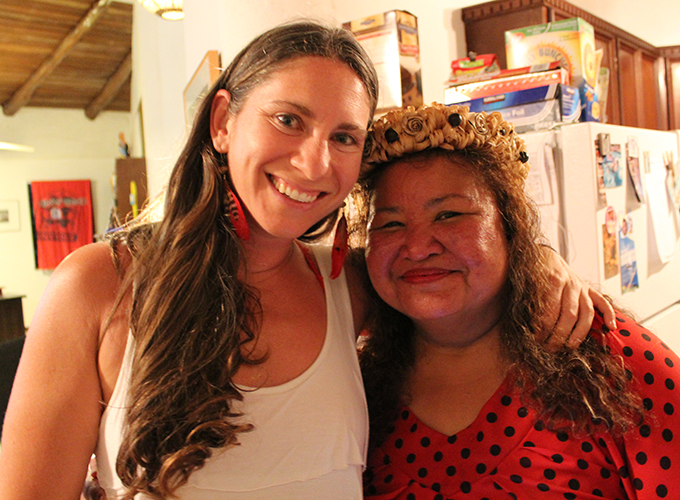
Pacific Media Centre Newsdesk
A postdoctoral researcher who has recently joined AUT’s Pacific Media Centre was inspired to carry out peace studies research when she visited Peace Park in Hiroshima as a 19-year-old while on board a floating classroom.
Fifteen years later, Dr Sylvia C. Frain has graduated from New Zealand’s National Centre for Peace and Conflict Studies at Otago University with a doctorate awarded for her research into US militarism in Guåhan (Guam) and the Northern Mariana Islands.
And now she is on a Strategic Research Initiative Fund (SRIF) fellowship with Auckland University of Technology where she hopes to be undertaking further groundbreaking Pacific and peace studies research with the PMC.
Dr Frain’s research in peace studies began in 2002 while studying aboard the Semester at Sea ship, traversing the globe in 100 days and visiting 10 countries.
“I was 19 and it was just after September 11. My sheltered United States perspective was immediately turned upside down,” she says.

“We travelled and studied in Cuba, Brazil, South Africa, Mauritius, India, Vietnam, China, and Japan and I learned of the US military’s involvement in each country.
“Visiting the Peace Park in Hiroshima was the final turning point. I knew I needed to work to ensure that war – especially nuclear war – never happens again.”
Raw colonial history
After graduating from the University of California, Santa Barbara, in the newly created Global Studies undergraduate programme, she moved to the US Virgin Islands, three islands that are “territories of the United States”.
With Puerto Rico nearby, “the colonial history of the Caribbean was raw and in our face. I began to understand how the US continues to benefit from colonialism”.
For her master’s degree, Dr Frain moved to Brisbane, Australia, and worked in Timor-Leste for not-for-profit organisations as a photographer.
“I was really shocked at the segregation between the aid agencies and the local communities,” she recalls.
“After experiencing the air-conditioned SUVs and guarded compounds compared to the malnourished population and level of poverty, I became critical of the current peacebuilding model.
“I was asked to take pictures of children to make them look ‘poor’ and told to make them look ‘in need’. Not only were there many qualified Timorese photographers who could do the work instead of me, I also felt I was replicating colonial power structures and promoting the aid agencies as ‘saviours.’”
Through family connections in Guåhan (Guam) and the Commonwealth of the Northern Mariana Islands (CNMI), Dr Frain was invited to research collaboratively with women who are resisting both contemporary colonisation and expanding militarisation.
Participatory action research
Her doctoral thesis incorporated participatory action research designed to enhance and support the community involved.
“I had been told that many researchers come to the [Marianas] islands to do research on the community and do not follow-up or develop lasting relationships. I recognised these former research methods as a form of recolonisation, extracting what the researcher needed for their benefit and profit while disregarding the community who made their research possible.
“It was a humbling experience and I am constantly relearning US history and unpacking my ‘settler responsibility’ and role within research”.
Dr Frain currently manages the Facebook page Oceania Resistance, which highlights decolonisation and demilitarisation work and features academic opportunities for those across Oceania.
In addition to academic publishing, this year she will be e-publishing her doctoral thesis to ensure it is accessible to those who graciously assisted her with the project.
It will be featured on the Guampedia platform, through Pacific Media Centre Online’s research section, and on the Northern Marianas Humanities Council’s website.
“I am looking forward to continuing with the collaborative model of research and am delighted to work in a centre that provides a participatory platform for unreported stories across the Pacific.”
PMC director Professor David Robie welcomed the appointment, saying Dr Frain’s research contribution would be a significant addition to the development of the centre and what it could offer the Asia-Pacific region.
The SRIF postdoctoral research fellowship is funded by the Faculty of Design and Creative Technologies.
Dr Frain’s doctoral research can be accessed via this page and she can be contacted at: Sylvia.Frain@aut.ac.nz










































